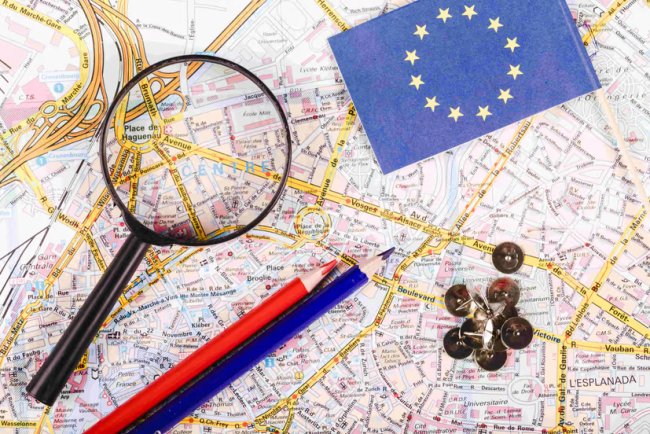TotalEnergies And Air Liquide Partner For Green Hydrogen
TotalEnergies and Air Liquide partner to produce green hydrogen, reducing CO2 emissions in European refineries.

TotalEnergies and Air Liquide announced a historic partnership to green refineries in Europe by making green hydrogen from the power of offshore wind. The ambitious project, supported by a €1 billion investment, aims to drastically decrease carbon emissions and help drive Europe's transition towards clean energy.
The collaboration is centered on two green electrolyzer projects in the Netherlands with a combined capacity of 450 megawatts (MW). The first, a 250 MW electrolyzer in Zeeland, will be co-developed by TotalEnergies and Air Liquide. The second, a 200 MW electrolyzer in Rotterdam, will be subject to a tolling arrangement, allowing TotalEnergies to produce 15,000 tons of green hydrogen per year from renewable electricity. Together, the projects will replace fossil fuel-based hydrogen used today in refineries, reducing emissions at TotalEnergies' Antwerp, Belgium, and Zeeland, Netherlands, facilities.
A key element of this initiative is the integration of offshore wind energy to power the electrolysis process. TotalEnergies’ offshore wind farms will supply renewable electricity, ensuring that the hydrogen produced is entirely green. By leveraging this strategic renewable energy source, the companies reinforce their commitment to sustainable industrial solutions and align with the European Union’s (EU) ambitious climate targets.
The scale of the emission reduction impact is significant. Once in operation, these projects are projected to reduce CO2 emissions by 450,000 metric tons per year at TotalEnergies' Dutch and Belgian refineries. As part of its overall sustainability plan, TotalEnergies has targeted reducing 3 million tons of CO2 emissions every year by 2030 via green hydrogen projects. The company considers this alliance a significant move towards meeting its decarbonization goals while enhancing Europe's low-carbon energy goals.
Apart from the environmental aspects, the strategic and financial elements of the transaction point to hydrogen's increasing position in industrial decarbonization. With a cumulative investment of more than €1 billion, the project indicates the magnitude of dedication needed to invest in green hydrogen infrastructure at the large-scale level. Applications have already been made under the several EU and domestic renewable energy programs to fund such initiatives.
The implementation timeline is evident: the Rotterdam electrolyzer should be in operation by late 2027, and the Zeeland electrolyzer by 2029. These are timelines that account for the complexity of constructing large-scale hydrogen infrastructure, from obtaining regulatory permits to tying in renewable sources of power and streamlining supply chains.
Green hydrogen is broadly seen as one of the central solutions for the decarbonization of heavy industry, including steelmaking, refining, and chemicals. But the industry has been hampered by high costs of production and unpredictable demand. TotalEnergies CEO Patrick Pouyanne has highlighted a strategic but prudent approach, first applying green hydrogen in industrial processes before moving into more uncertain sectors such as refueling stations for passenger vehicles.
Industry figures have welcomed the initiatives strongly. Vincent Stoquart, Refining & Chemicals President of TotalEnergies, spoke of the strategic value of this alliance in its pursuit of the company's decarbonization objective. "This alliance with Air Liquide represents a new step in our quest to decarbonize hydrogen in our refineries by 2030. Thanks to the offshore wind energy, we strengthen our integrated electricity strategy," he declared.
Emilie Mouren-Renouard, who is part of Air Liquide's Executive Committee, also highlighted the wider influence of the projects. "Flagship projects such as these will be a crucial driver for lowering emissions in hard-to-abate sectors. They also enhance Europe's leadership in renewable and low-carbon hydrogen production," she said.
The step is taken as the world's energy players are investing more and more in hydrogen to achieve climate targets and compliance with regulations. Europe has especially set itself as a front runner in hydrogen production, with the EU planning to produce 10 million tons of renewable hydrogen by 2030. Projects such as the TotalEnergies-Air Liquide partnership help directly towards achieving these goals, making Europe a competitive player in the clean energy sector.
At the same time, other industry players are also advancing hydrogen development. A related announcement had Hygreen Energy and Coxabengoa unveil a strategic partnership to enhance Europe's green hydrogen market. Such partnerships demonstrate the increasing momentum for hydrogen as a cornerstone of the world's energy transition.
In the future, TotalEnergies and Air Liquide's success in these projects will be the reference point for future green hydrogen projects. With governments and industries increasingly demanding cleaner energy solutions, hydrogen's contribution to lowering industrial emissions will keep growing. As the projects develop, they will not only drive decarbonization but also lay the groundwork for a more sustainable and resilient European energy system.
What's Your Reaction?

















